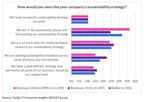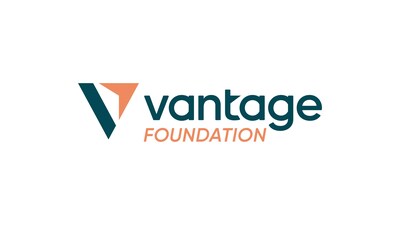Fintech PR
Omdia: Only 15% of banks have a well-defined sustainability strategy

LONDON, Oct. 16, 2023 /PRNewswire/ — Ahead of next month’s COP28 summit, Omdia’s new report, ‘Market Landscape: State of Sustainability in Retail Banking‘, has found the vast majority of banks do not have a fully-functional sustainability strategy; many are still analyzing, despite sustainability being a matter of strategic concern for several decades.
The increasing regulation around net zero presages a general movement from guidelines toward formal legislation around sustainability targets and standards. This presents banks with a significant task to respond accordingly within their strategies and policies.
Key findings from the study include:
- Just 15% of retail banks stated they have a well-defined sustainability strategy that includes their supply chain, slightly below the global average of 18%.
- A larger number (36%) of banks with revenues between $50–$999m stated that they are in the assessment or formulation stage of building a sustainability strategy.
- Keeping up with the latest regulations and developments is the most challenging aspect, with 45% of retail banks noting this as one of their top three priorities.
- 39% of respondents overall put a lack of employee engagement and 36% a lack of clear metrics and suppliers who do not share their sustainability goals as challenges.
Many businesses are still in the early stages of building their sustainability strategies and deploying technology solutions to move them towards their ESG goals. The key concern is the lack of a clear definition of sustainability in retail banking that is hampering banks’ efforts to implement it into their businesses in a way that is consistent with their broader strategic objectives.
Ouliana Smith, Omdia Senior Research Analyst commented: “Retail banks that are focused exclusively on the delivery of services will have meaningful impacts on sustainability only by leveraging their strategy through their supply chain; data centers, and manufacturers of the devices through which their services are deployed and used.
“Banks need to understand the developments across their entire value chain and monitor progress in real-time. Given the complexity of any major change in the value chain, as all suppliers will also be grappling with their own transition to sustainability, it is better to start sooner rather than later.”
ABOUT OMDIA
Omdia, part of Informa Tech, is a technology research and advisory group. Our deep knowledge of tech markets combined with our actionable insights empower organizations to make smart growth decisions.
Fasiha Khan [email protected]
![]() View original content:https://www.prnewswire.co.uk/news-releases/omdia-only-15-of-banks-have-a-well-defined-sustainability-strategy-301957333.html
View original content:https://www.prnewswire.co.uk/news-releases/omdia-only-15-of-banks-have-a-well-defined-sustainability-strategy-301957333.html

Fintech
Banking and Capital Markets: Navigating a Complex Future

Curated in collaboration with the London School of Economics and Political Science (LSE)
The global financial industry stands at a pivotal juncture, facing a rapidly evolving landscape shaped by technological disruption, sustainability mandates, and geopolitical uncertainties. The end of prolonged accommodative monetary policies has ushered in an era of increased scrutiny, regulatory tightening, and heightened demand for innovation. At the same time, financial technology (fintech) continues to transform the sector, driving new opportunities and challenges for traditional banking systems.
This article delves into the strategic issues currently defining Banking and Capital Markets. Drawing from expert insights curated by Lutfey Siddiqi, Visiting Professor-in-Practice at LSE, it examines the dynamic risk environment, emerging technology trends, shifts in banking business models, and the growing focus on sustainability and talent development.
Key Issues Influencing Banking and Capital Markets
- The Financial Risk Landscape: Heightened geopolitical tensions and regulatory demands are reshaping the industry.
- Financial Technology: Emerging technologies such as artificial intelligence (AI) and blockchain offer potential but also pose significant implementation challenges.
- Banking Business Models: Institutions are adopting diverse strategies to navigate competition and shifting market demands.
- Financial Talent: Attracting the next generation of banking professionals requires a clear purpose and forward-thinking policies.
- Sustainability and Finance: Balancing environmental and social goals with immediate business priorities is a growing challenge.
1. Latest Insights: Shifting the Banking Paradigm
Experts highlight the profound challenges and opportunities facing financial institutions today. From geopolitical volatility to advances in fintech, the banking landscape demands unprecedented agility. Recent developments include:
- Monetary Policy Adjustments: China’s central bank explores easing policies to boost investment.
- Regulatory Scrutiny: Global banking rules, such as Basel 3.1 reforms, are under review, signaling potential shifts in global supervision.
- Financial Inclusion: Updates from the Financial Action Task Force (FATF) aim to balance anti-money laundering standards with broader access to financial services.
These trends emphasize the need for financial institutions to anticipate disruptions while fostering resilience and innovation.
2. Strategic Context: Transforming Banking in a High-Stakes Era
2.1 The Financial Risk Landscape
Banks are grappling with an increasingly volatile environment characterized by geopolitical tensions, regulatory reforms, and market disruptions. The end of ultra-loose monetary policies has highlighted weaknesses in traditional funding models, exemplified by the high-profile collapses of Silicon Valley Bank and Credit Suisse in 2023.
Regulators are tightening oversight, expanding their focus to include non-bank institutions and fintech companies. Additionally, rising geopolitical tensions demand localized data operations, robust cybersecurity measures, and new approaches to global strategy.
Key takeaway: In an age of uncertainty, resilience and stability are essential.
2.2 Financial Technology
The Fourth Industrial Revolution continues to reshape banking through advancements like AI, blockchain, and quantum computing. However, challenges remain, such as limited real-world blockchain applications and increasing cybersecurity risks tied to digitalization.
Financial institutions must adopt technology thoughtfully, focusing on solutions that address specific operational pain points and align with organizational goals. Balancing efficiency with contingency planning for outages and cyber threats is paramount.
Key takeaway: Tech adoption must prioritize practicality, security, and alignment with purpose.
2.3 Banking Business Models
Global trends are driving a diversification of banking models. Some institutions are scaling back operations in unprofitable markets, while others are leveraging acquisitions or digital innovation to expand. The rise of big tech competitors—armed with vast behavioral data—adds a new layer of complexity to the competitive landscape.
Emerging trends include:
- Consolidation of corporate and private banking services.
- Strategic retreats from costly markets, such as HSBC’s exit from US retail banking.
- Big tech firms offering financial services as data-driven loss leaders.
Key takeaway: Differentiation and adaptability are critical in a fragmented, competitive market.
2.4 Financial Talent
The banking sector faces a mounting talent crisis, particularly among younger generations who view the industry as outdated or misaligned with their values. To attract top talent, banks must redefine their purpose and emphasize their commitment to sustainability, innovation, and career growth opportunities.
Surveys indicate that young professionals seek workplaces offering training, flexibility, and inclusive leadership. Reskilling initiatives and a focus on digital expertise will also be key to preparing employees for the future.
Key takeaway: A compelling vision for the future of banking is essential to attract and retain top talent.
2.5 Sustainability and Finance
Sustainability has become a focal point for the financial industry, driven by growing demand for ESG (Environmental, Social, and Governance) initiatives. However, backlash against greenwashing and tokenism has led banks to reevaluate their approaches.
Balancing short-term priorities like energy security with long-term goals like combating climate change requires bold leadership. Opportunities abound in areas such as carbon trading, green bonds, and sustainability-linked investment products. However, success demands authenticity and a commitment to systemic change.
Key takeaway: Embedding sustainability into core operations is vital for long-term success.
Transformation Maps: A Strategic Tool for Leaders
This analysis leverages the World Economic Forum’s Strategic Intelligence Transformation Maps, which provide an interconnected view of global trends and challenges. These tools enable leaders to explore key topics, such as cybersecurity, fintech, and sustainability, and understand how they shape the future of Banking and Capital Markets.
Conclusion
The financial industry’s journey through this transformative era requires agility, innovation, and a deep commitment to purpose. From adapting to geopolitical tensions to embracing sustainability and nurturing top talent, financial institutions must strike a delicate balance between tradition and progress.
By leveraging technology, redefining business models, and embedding ESG principles into their strategies, the sector can navigate today’s challenges and build a resilient, forward-thinking future.
For more insights and resources, visit the World Economic Forum’s Strategic Intelligence platform.
The post Banking and Capital Markets: Navigating a Complex Future appeared first on News, Events, Advertising Options.
Fintech PR
Xinhua Silk Road: Micro-documentaries depicting people-centered governance initiatives released
BEIJING, Nov. 29, 2024 /PRNewswire/ — A series of micro-documentaries titled “the People’s City in Jing’an” has been released, showcasing real stories about the district’s initiatives in urban construction, governance, and development in Shanghai.
The series also highlights vivid practices of Jing’an in implementing the concept of a people-centered city.
Original link: https://en.imsilkroad.com/p/343370.html
Video – https://mma.prnewswire.com/media/2569899/video.mp4
![]() View original content:https://www.prnewswire.co.uk/news-releases/xinhua-silk-road-micro-documentaries-depicting-people-centered-governance-initiatives-released-302318776.html
View original content:https://www.prnewswire.co.uk/news-releases/xinhua-silk-road-micro-documentaries-depicting-people-centered-governance-initiatives-released-302318776.html

Fintech PR
VANTAGE FOUNDATION PARTNERS WITH FRESH START TO SUPPORT EDINBURGH COMMUNITIES

EDINBURGH, Scotland, Nov. 29, 2024 /PRNewswire/ — Vantage Foundation has partnered with Fresh Start, an Edinburgh-based charity helping people who have been homeless establish themselves in their new home through the provision of goods and services. They work to end the cycle of homelessness and for a better life for those living in poverty.
Fresh Start was established in 1999 from a desire to help and support their community where issues such as homelessness, deprivation and poverty were prevalent. Taking a person-centered approach, the organisation began to distribute Starter Packs, which are packs of essential household items to help people establish themselves in their new home.
They are now distributing over 14,000 packs per year and helping over 2,000 people. They have also expanded to offer more services over the years in response to the needs of the people in their communities, such as providing kitchen appliances, cooking classes and painting and decorating services.
Vantage Foundation visited Fresh Start in November to pledge support for their cause by sponsoring Starter Packs. “We are pleased to support Fresh Start in their mission to help people make a home for themselves,” said Steven Xie, Executive Director of Vantage Foundation. “Their mission firmly resonates with us and this partnership is a reflection of our own commitment to address invisible challenges to social immobility.”
“We want to give people an opportunity to make themselves feel at home,” explained Jen McQuistan, Corporate Partnership Officer at Fresh Start. “It is important for them to have a space to call their own and develop a true sense of belonging in the community.”
For more information on Fresh Start and how you can get involved, visit their website at https://www.freshstartweb.org.uk/
About Vantage Foundation
Vantage Foundation is an independent charitable organisation launched at the McLaren Technology Centre in the UK in 2023. The foundation has worked with charity organisations around the world, including The iREDE Foundation in Nigeria, Teach For Malaysia in Malaysia, and Instituto Claret in Brazil.

For more information, please visit www.vantage.foundation
Photo – https://mma.prnewswire.com/media/2569869/photo.jpg
Logo – https://mma.prnewswire.com/media/2299654/Vantage_Foundation_Logo.jpg
![]() View original content:https://www.prnewswire.co.uk/news-releases/vantage-foundation-partners-with-fresh-start-to-support-edinburgh-communities-302318773.html
View original content:https://www.prnewswire.co.uk/news-releases/vantage-foundation-partners-with-fresh-start-to-support-edinburgh-communities-302318773.html

-

 Fintech3 days ago
Fintech3 days agoFintech Pulse: A Daily Dive into Industry Innovations and Developments
-

 Fintech2 days ago
Fintech2 days agoFormer MD of SUI Foundation, Greg Siourounis, Joins xMoney Global as Co-Founder and CEO to build MiCA-Regulated Stablecoin Platform
-

 Fintech PR7 days ago
Fintech PR7 days agoRedefining Financial Frontiers: Nucleus Software Celebrates 30 Years with Synapse 2024 in Singapore
-

 Fintech4 days ago
Fintech4 days agoQuantum Security and the Financial Sector: Paving the Way for a Resilient Future
-

 Fintech4 days ago
Fintech4 days agoFintech Latvia Association Releases Fintech Pulse 2024: A Guide to Latvia’s Growing Fintech Hub
-

 Fintech PR6 days ago
Fintech PR6 days agoChina’s AIMA brand electric motorbike is now in Bangladesh
-

 Fintech PR1 day ago
Fintech PR1 day agoYunoJuno Recognised as Best International Contractor Provider, Revolutionising Global Freelance Management
-

 Fintech PR6 days ago
Fintech PR6 days agoChina Telecom Gulf Officially Launches in Saudi Arabia for Business




